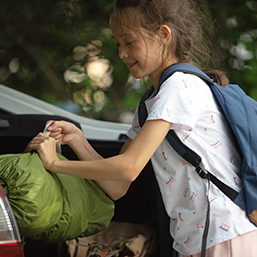
I was a camp kid growing up. I went to summer camp every year for a week or two, learning all about tying knots, how to build fires, and how to save and scrimp on money for the Tuck Canteen so I could arrange for a bag of chips AND a bottle of pop almost every day! I learned how to build a sundial, how to eat 14 hot dogs in a single sitting (not advisable!), and some important social skills.
\n \nI also remember having a “stomachache” when I wanted to just go home. Tums, apparently, is the key to homesickness!
\nI never wanted to go to camp. I fought it, I dreaded packing up the sleeping bag and rudimentary “shaving kit” and heading out for the Sunday afternoon drop-off.
\nI missed my home, my bed, and my life. Spending the next two weeks with a bunch of strangers for an emerging introvert like me was not an insignificant issue! But yet, at the end of the two weeks or so, I was not ready to go home either. It’s this dichotomy of simultaneously loving and hating camping life that is present in many children, not to mention the odd mix of guilt and relief that parents feel when they drop their kids off.
\nYou might be guilty, thinking, “Do I not care enough about my kids to keep them with me every moment possible?” while being relieved that, “I now have some time to really relax and work without worrying about entertaining my kids!” It’s a weird feeling.
\nSo – what do we do about children who may not want to go to a summer camp?
\nActually, there’s lots of things, but it starts with honesty and openness. Children need to feel wanted and accepted, but our fear is that sending kids to camp, even day camps, may subtly imply, “I don’t want you here.” Of course, that is not our intent! So, we need to short-circuit that kind of thinking. What we want is for our kids to have a range of experiences that we may not be able to provide. Camps can provide a load of experiences that parents may not be able to offer. For instance, it’s unlikely that you, the reader, can start a fire with a magnifying glass (at least, not without practice.) At a camp, this is basic, easily taught, and practiced in a safe environment.
\nAdditionally, what to do about the introverted child at camp? By being isolated from family – in a positive way – children develop social relationships beyond those of family and relationships at school. Essentially, it’s an opportunity to meet all sorts of people, some of whom you will like, and some you will not (sort of like life!)
\nIf you want your child to experience life at camp, start with validating their concerns. This does not mean that they get to decide if camp life is right for them. They don’t know yet, so listen with empathy, but encourage them to take a risk – a safe risk!
\nSecond, listen for specific concerns. Some kids really struggle with unstructured situations, and camp life is full of unstructured time. Provide them with some ideas about what to do during that down time. The best way to do this is to speak with the camp administrators/leaders, who have all sorts of ideas about cool things to do when camping!
\nIt’s also wise to have kids find like-minded peers. Camps are full of a variety of people, so encourage your child to reach out to others in a natural way – simply asking a fellow camper about what kind of music they like can go a long way!
\nLike I said, I was a camper and I remember one camp where the cabin was lined with bunk beds around the walls with one cot in the middle. I arrived last, so that is the cot I got. It was uncomfortable to be in the direct centre of the cabin, but I eventually (like, within a few hours) had made some friends around the perimeter simply by sharing some rudimentary knowledge I had about certain metal bands. It really takes very little, as most kids at camp share in some degree of insecurity and homesickness.
\nAs parents, I encourage you to resist over-connecting. Many camps have restrictions on cell phones, and these restrictions are wise. Instead, pre-pack some letters (remember those hand-written things on pieces of paper?) filled with encouragement and positive thoughts – things you appreciate about your child. These can be in their backpack or given to camp counsellors to distribute daily. It’ll take about an hour to write two weeks of encouraging notes… time very well-invested compared to the potential constant texting!
\nIf all else fails, listen to both your child and your gut. If they are miserable, or perhaps experiencing bullying, do not force them to simply “suck it up.” Talk with your child, listen to your child, and also speak with camp counsellors, who may be able to provide context. But if the time comes that it is not reasonable to keep your child at camp, picking them up and going home is not a failure whatsoever, just an experiment that did not work out.
\nThat said, summer camps can provide some excellent experiences and memories that are to be encouraged!
\n\n
Dr. Brent Macdonald is a frequent guest on CBC, Global Television, Breakfast Television, and CTV. He is currently the lead psychologist with Onward Psychology Group (onwardpsychology.ca), which, in addition to providing counselling and assessment services, also provides consultation services to educators and parents.
\n\n
See our related articles:
\nCalgary’s Child Magazine © 2025 Calgary’s Child